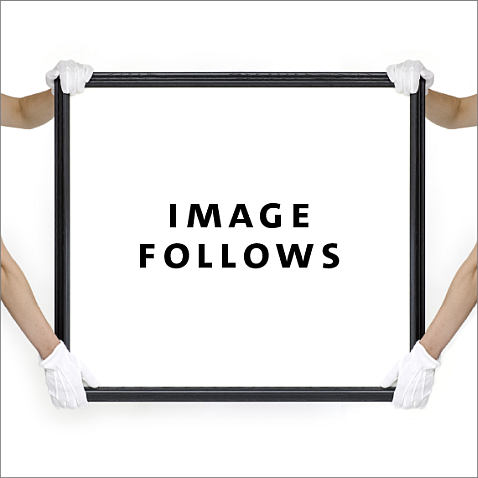Vente: 554 / Modern Art Day Sale 08 juin 2024 à Munich  Lot 123001302
Lot 123001302
 Lot 123001302
Lot 123001302 
123001302
Max Beckmann
Gruppenbildnis Edenbar, 1923.
Woodcut
Estimation: € 20,000 / $ 21,400
Les informations sur la commission d´achat, les taxes et le droit de suite sont disponibles quatre semaines avant la vente.
Gruppenbildnis Edenbar. 1923.
Woodcut.
Hofmaier 277 B (of B). Signed. From an edition of 40 copies, some unnumbered. On firm Japan imitation paper. 49.5 x 49.6 cm (19.4 x 19.5 in). Sheet: 68,5 x 55,6 cm (27 x 21,8 in).
Printed by Fritz Voigt, Berlin, and published by I. B. Neumann, Berlin. [CH].
• In works with motifs from bars, dance halls and nightclubs, Max Beckmann mirrored society between the wars.
• Atmospheric depictions of crowded bars and cafés as places of modernity are a recurring theme in the artist's prints and paintings from the 1920s onwards, today they count among his most important works.
• This large-format woodcut is one of Max Beckmann's best-known graphic works.
• In the foreground we see the Beckmann collector Johanna Loeb and the Argentinian singer Elsita Lutz, who was a friend of the artist.
• Further copies of this woodcut can be found in, among others. the Museum of Modern Art, New York, the National Gallery of Art in Washington, D.C., the Art Institute of Chicago and the Museum Kunstpalast, Düsseldorf.
PROVENANCE: Galerie St. Etienne, New York.
Corporate Collection Ahlers AG, Herford (acquired from the above in 2012).
EXHIBITION: Schwarz auf Weiß. Druck-Graphik im Wandel der Zeit von Rembrandt bis Dieter Roth, Foundation Ahlers Pro Arte / Kestner Pro Arte, Hanover, September 28, 2013 - January 5, 2014, cat. p. 37 (illu.).
Blaues Land und Großstadtlärm - Ein expressionistischer Spaziergang durch Kunst und Literatur, Franz Marc Museum, Kochel am See, April 30 - October 3, 2017, cat. p. 152 (no illu.).
LITERATURE: James Hofmaier, Max Beckmann. Catalogue raisonné of his prints, Bern 1990, vol. 2, no. 277 II B (of II B).
Woodcut.
Hofmaier 277 B (of B). Signed. From an edition of 40 copies, some unnumbered. On firm Japan imitation paper. 49.5 x 49.6 cm (19.4 x 19.5 in). Sheet: 68,5 x 55,6 cm (27 x 21,8 in).
Printed by Fritz Voigt, Berlin, and published by I. B. Neumann, Berlin. [CH].
• In works with motifs from bars, dance halls and nightclubs, Max Beckmann mirrored society between the wars.
• Atmospheric depictions of crowded bars and cafés as places of modernity are a recurring theme in the artist's prints and paintings from the 1920s onwards, today they count among his most important works.
• This large-format woodcut is one of Max Beckmann's best-known graphic works.
• In the foreground we see the Beckmann collector Johanna Loeb and the Argentinian singer Elsita Lutz, who was a friend of the artist.
• Further copies of this woodcut can be found in, among others. the Museum of Modern Art, New York, the National Gallery of Art in Washington, D.C., the Art Institute of Chicago and the Museum Kunstpalast, Düsseldorf.
PROVENANCE: Galerie St. Etienne, New York.
Corporate Collection Ahlers AG, Herford (acquired from the above in 2012).
EXHIBITION: Schwarz auf Weiß. Druck-Graphik im Wandel der Zeit von Rembrandt bis Dieter Roth, Foundation Ahlers Pro Arte / Kestner Pro Arte, Hanover, September 28, 2013 - January 5, 2014, cat. p. 37 (illu.).
Blaues Land und Großstadtlärm - Ein expressionistischer Spaziergang durch Kunst und Literatur, Franz Marc Museum, Kochel am See, April 30 - October 3, 2017, cat. p. 152 (no illu.).
LITERATURE: James Hofmaier, Max Beckmann. Catalogue raisonné of his prints, Bern 1990, vol. 2, no. 277 II B (of II B).
Like many other bars at that time, the bar at Berlin's Hotel Eden was a meeting place for the Berlin bourgeoisie, who sought to drown the trauma of the lost war in a hedonistic ecstasy. Beckmann sketched the senselessness of these evenings very pointedly in the depiction of these three people. Although they sit close to one another, they don’t look at each other. Each one of them just gazes into an imaginary distance. In this work, Beckmann addresses the uncanny feeling of existential isolation in the midst of a crowd enjoying itself with great sensitivity. The back view of Johanna Loeb closes the composition in the front. Johanna Loeb was friends with Elsita Lutz, a singer from Argentina, who sits next to her. The sitter in the background, probably Elsita Lutz's husband, had business connections with Johanna Loeb's husband.
Beckmann's large-format woodcut is one of the most important he created in the 1920s. In letters to Reinhard Piper and Julius Meier-Graefe, Beckmann expressed his enthusiasm for Fritz Voigt, the famous Berlin printer who also printed the edition of this large-format woodcut. [EH]
Beckmann's large-format woodcut is one of the most important he created in the 1920s. In letters to Reinhard Piper and Julius Meier-Graefe, Beckmann expressed his enthusiasm for Fritz Voigt, the famous Berlin printer who also printed the edition of this large-format woodcut. [EH]
123001302
Max Beckmann
Gruppenbildnis Edenbar, 1923.
Woodcut
Estimation: € 20,000 / $ 21,400
Les informations sur la commission d´achat, les taxes et le droit de suite sont disponibles quatre semaines avant la vente.



